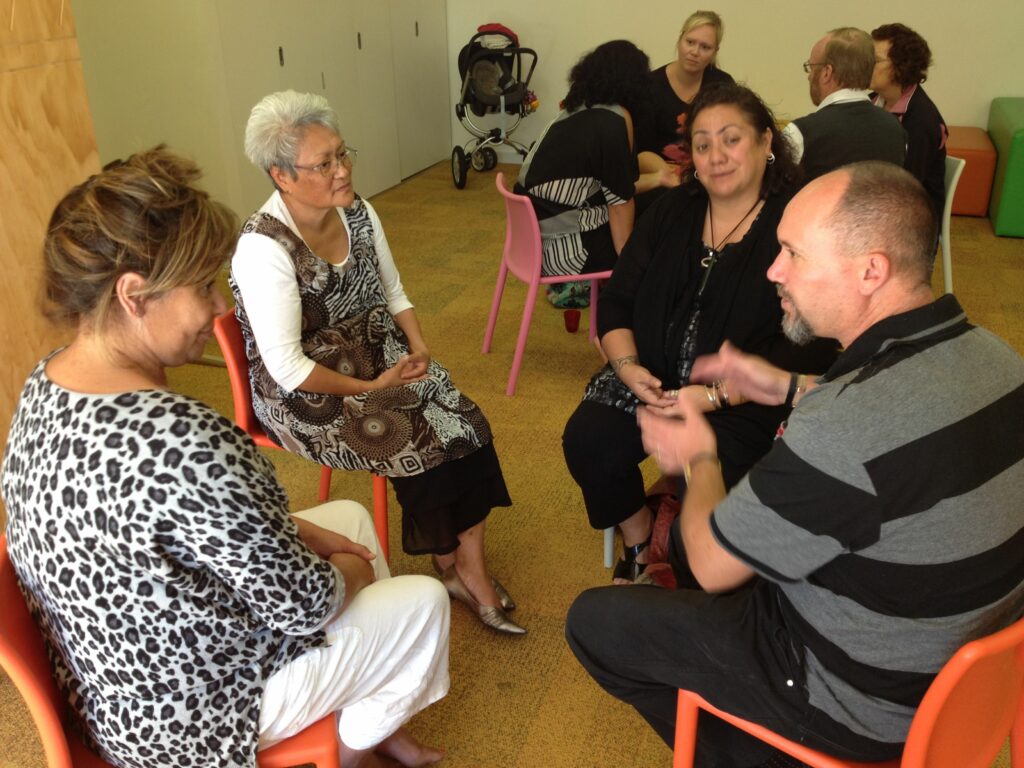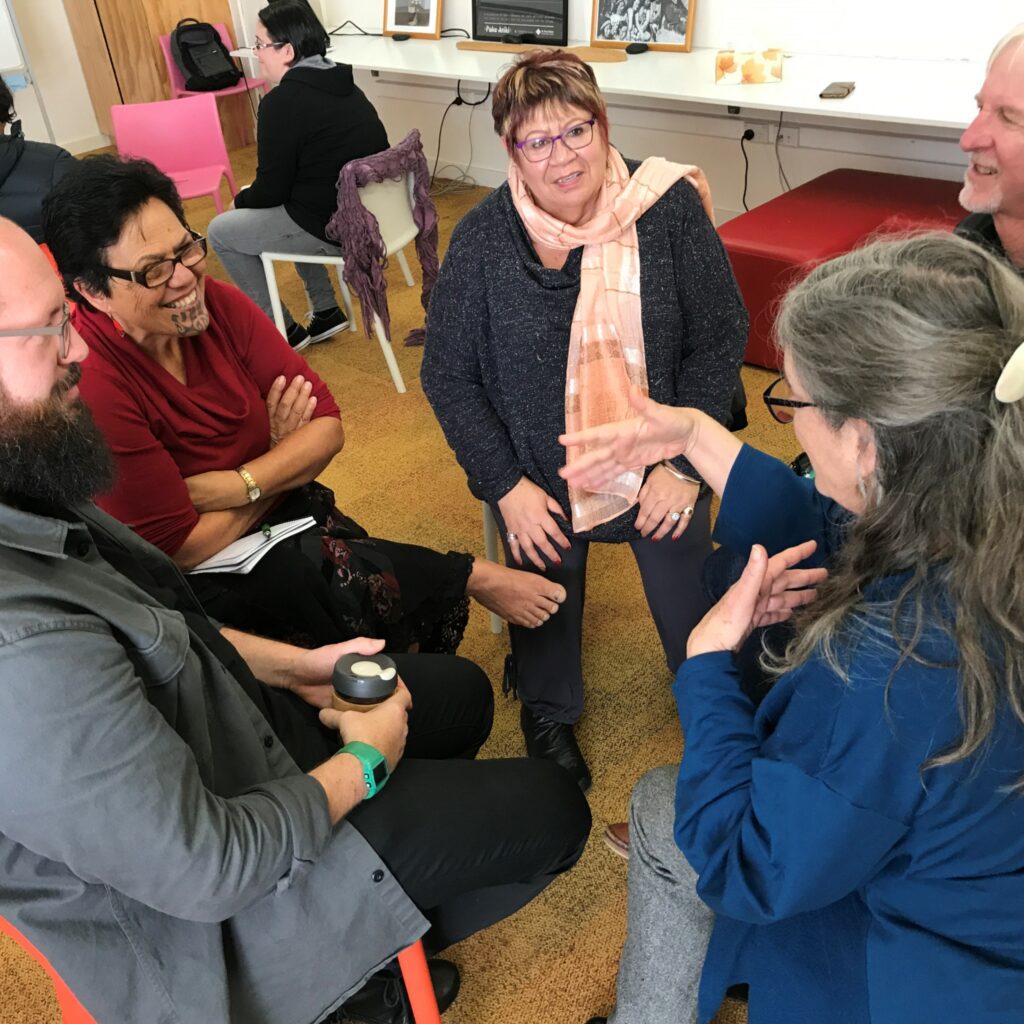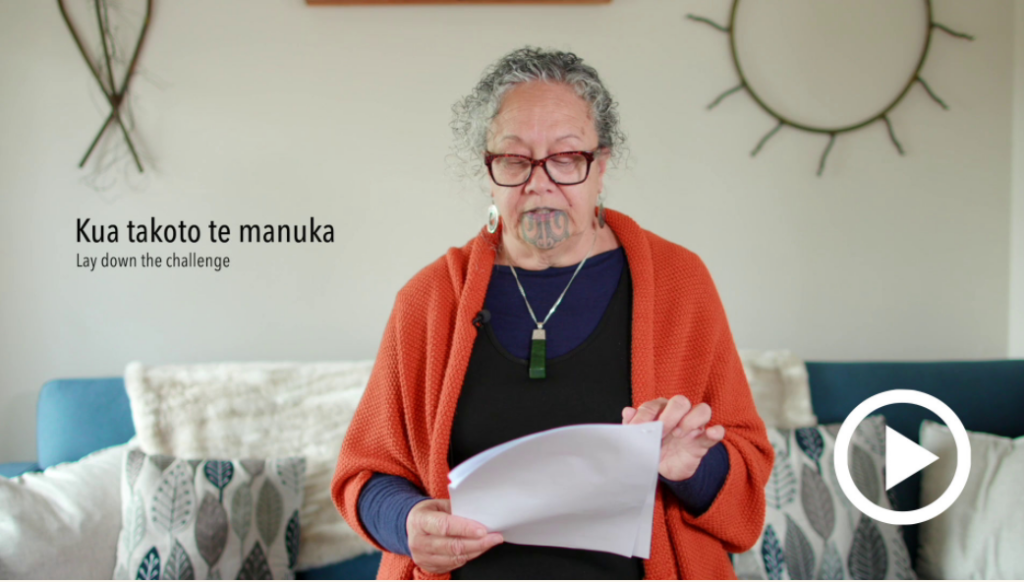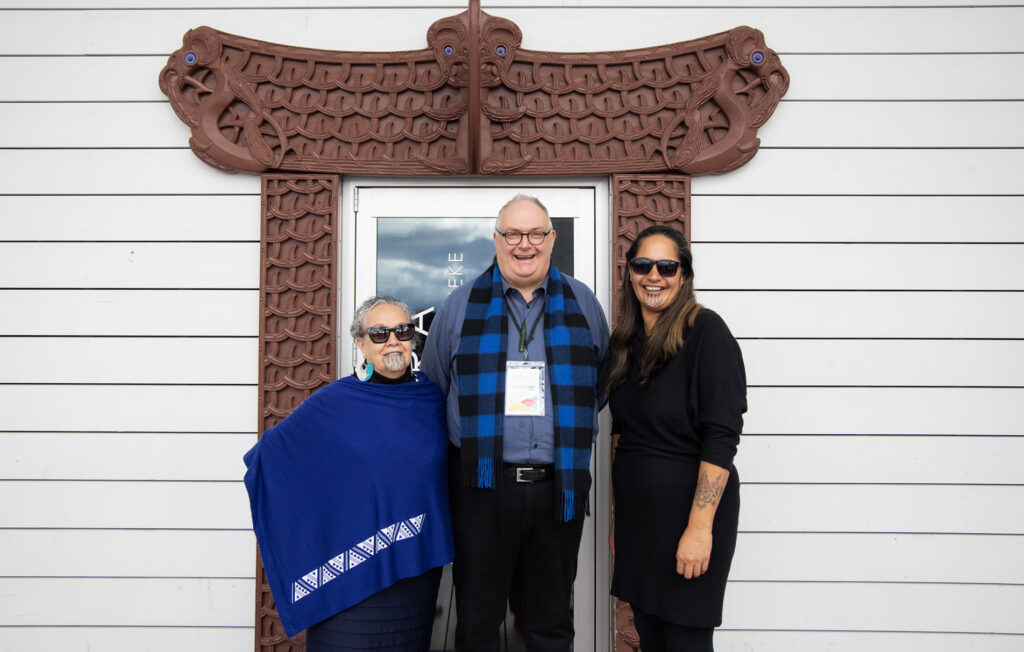




Fostering Active Citizenship — Learning from Taranaki
Active Citizenship is term we’re hearing more about and it’s a key foundation of effective community-led development. But what does it really mean and how do you grow it? We spoke with community innovators in Taranaki to hear about their journey.
The individual awakening of citizenship is a critical element in how our communities
develop – because this awakening involves figuring out just what part of making
things better has got your name on it.
vivian Hutchinson 2012
Active Citizenship is term we’re hearing more about and it’s a key foundation of effective community-led development. How Communities Awaken – Tū Tangata Whenua is an award winning four-month Masterclass for active citizenship first established in Taranaki in 2011 now operating as a partnership between Community Taranaki and Tū Tama Wahine o Taranaki. Around 350 people have now participated in the Masterclass process, which has evolved a learning approach based on tikanga Māori, wānanga and community-led adult education practices. As a result, a diverse range of community members have now embraced their citizenship, developed a shared language, and formed strong networks across their community.

Masterclass participants deep in conversation.
Photo credit: Tū Tama Wahine o Taranaki
But what is Active Citizenship? For Masterclass co-founder, vivian Hutchinson, it’s “about finding purpose, place, relationships, and personal meaning through asking big questions and engaging in deep conversation with others.”
The Taranaki Active Citizenship Masterclass process has come about through skilful curation and longstanding, trusting relationships between vivian and the whanau behind Tū Tama Wahine o Taranaki. Awhina Cameron, CEO of Tū Tama Wahine o Taranaki, highlights the significance of friendship as the foundation for the collaboration. “Like any small community you can have MOU’s and service level agreements, but the reality of how it works is through friendship and whakapapa. Our work with vivian is an example of this. He was mentored by some of our late, great aunties.”

“The Masterclass really made me stop and re-analyse all my work, particularly the place of social services versus real community engagement.”
“I will now approach my group work much slower. I won’t rush in and fix the problem, instead I will try to think outside the square and use a more inclusive approach.”
Feedback from Masterclass Participants
Photo credit: Tū Tama Wahine o Taranaki
Masterclass fundamentals
The concept of invitation and intentional participation is core to the Masterclass approach. vivian notes “the personal invitation to participate helps to curate a diverse network.” People come and choose to become part of the process due to this invitation. Unlike many traditional learning opportunities, individuals are invited to attend as themselves, not as a representative of an organisation or other entity. Awhina adds that this invitation crosses boundaries between work and citizenship – and for many it is an awakening of new ways of thinking.
The Masterclass is a process of conversations. Participants are encouraged to listen and delve deep, listening to stories, considering key questions, and sharing in large and small group circle-based conversations.
Every class is different. I expect to learn as much as I have to share.
vivian Hutchinson
The Masterclass topics of Invitation, Possibility, Ownership, Dissent, Commitment, and Gifts were first offered by the US author Peter Block in his book “Community – the Structure of Belonging” (2008). To this, the Taranaki team added conversations on Community, Citizenship and Action. Workshops on these concepts are held fortnightly, with participants gifted books and a wide range of other readings and resources to explore between. During each workshop, participants lead workshop content by sharing their own history and stories as an introduction to the conversation. Local elders and thought leaders are invited into the conversations to ‘stretch’ them by sharing their perspectives. In terms of Mātauranga Māori, these ‘stretches’ have included insights into Tū Tangata Whenua, Tikanga, Rangatiratanga, Whanaungatanga, Māramatanga, Ōhākī and Koha. (These links will lead you to Te Aka – Māori Dictionary meanings for these words.)

Ngaropi Raumati, Kuia and Director of Tū Tama Wahine o Taranaki has created Te Kai a Te Rangatira (2020) This video series is based on her stretch conversations on the topics above.
For many, it’s a challenging process. It invites a slowing down, actively listening and committing to a journey. Awhina notes that the Masterclass is not therapeutic, nor is it mentoring. It allows time and space for people to do some deep thinking about self and place in community, alongside and in conversation with others.
The Masterclass has made me ‘feel more like myself’ than I have for a long time.
Participant feedback

Ngaropi Raumati (Tū Tama Wahine o Taranaki), vivian Hutchinson (Community Taranaki) and Charissa Waerea (ACE Aotearoa) — pictured outside Te Raukura, Te Wharewaka o Pōneke, ACE National conference June 2021.
Photo credit: ACE Aotearoa
The Masterclass leads are careful not to claim praise for outcomes that have emerged for individuals who have been part of the Masterclass journey. They remain humble, and acknowledge that changes, activations, projects, and personal development belong to the participants, not them as individuals, or their organisations. Despite this, both feel a strong sense of positive community development in Taranaki because of the Masterclass process. Their success also formally recognised thorough the awarding of the 2020 ACE Aotearoa Annual Award for Community Programme of the year – Tangata Whenua.
An evolving bicultural approach
The Masterclass process, content and format has continued to evolve. A couple of years after the first conversations, Tū Tama Wahine o Taranaki wanted to become involved, but to do it their way required a bicultural approach vivian says. “This was easily done due to some long-standing relationships, over several generations. The trust was already there for creative collaboration.”
Awhina speaks of the advancement of Māori and indigenous ideas of community development and active citizenship that has happened through conversations over time. For an organisation like Tū Tama Wahine o Taranaki, it’s about walking in both worlds and having to translate concepts with a te ao Māori perspective. “This information wasn’t available at the beginning, it is content that we have had to think through, explore readings, look at other indigenous communities and land upon our own thinking”.
What’s changed?
You can’t operate in a community without being part of the community.
Awhina Cameron
Both vivian and Awhina enthusiastically explain that for them, the Masterclass has been the most profound, effective, and directly beneficial ‘professional development’ programme they have witnessed. Finding and opening-up space for deep conversations and reflection has led many participants to new insights on citizenship, belonging, cultural competence, assets that are latent in their communities and their own individual purpose and contribution to community. And for those working as service providers, the Masterclass has grown understanding about the need for people to be themselves, have space to think and find their purpose – that their work needs to be about more than just services says Awhina. “Having kaimahi, community members, clients and others all involved together in the Active Citizenship process, and as active citizens, thereafter, is contributing to the overall health and success of the community.”
Participants finish the Masterclass with an action plan for their own roles and direction as active citizens in the community. This has led to participants progressing a range of initiatives that hold meaning for them, from kaumatua group activities to mirimiri /massage for babies, to a community garden project, community gymnasium, and kapu korero sessions, where community members come together to practice their every day reo.
Sharing what’s been learned
There is tremendous knowledge held within the group and people were extremely generous in sharing their wisdom.
Masterclass participant
With Covid bringing a halt to running the Masterclass in person, the team has put their minds to other ways of sharing their knowledge.
Tū Tama Wahine o Taranaki and Community Taranaki have developed a written guide about the Masterclass as a step towards sharing this knowledge with other communities. This extensive resource is available on their website and was supported by the Department of Internal Affairs. Awhina emphasises the importance of asking questions and engaging in conversation, and offers a way of approaching the guide – “Ask, where is the relevance of this thinking, particularly around Māori concepts?”
Alongside the Masterclass Guide, Ngaropi Raumati, Kuia and Director of Tū Tama Wahine o Taranaki has created Te Kai a Te Rangatira (2020) video series based on her stretch conversations held in the Masterclass.
vivian has brought together a collection of essays on topics at the heart of Active Citizenship and published these into a book, How Communities Awaken — Some Conversations for Active Citizens (2021). The essays are freely available on the Community Taranaki website.
vivian’s advice for other communities looking to begin something similar is to make time and space to read and absorb the material. Like Awhina, he views the Taranaki Masterclass resources as a place to begin conversations and evolve from there. A useful start to creating your own Masterclass can be found in his paper, Some Elements of Design.
Get your thinking about Active Citizenship started!
Read the guide to the Taranaki Active Citizenship Masterclass
Watch Tū Tama Wahine o Taranaki’s “stretch” videos by Ngaropi Raumati which look at Active Citizenship from a Te Ao Māori lens
Read How Communities Awaken essays by vivian Hutchinson
In 2022, Inspiring Communities will share vivian’s essays on our social media. We are keen to open a wider national conversation about active citizenship, and ways to grow more of it across our communities. Please join us for this conversation!
In 2022, Inspiring Communities will share vivian’s essays on our social media. We are keen to open a wider national conversation about active citizenship, and ways to grow more of it across our communities. Please join us for this conversation! Like and follow our Facebook and LinkedIn pages and make sure you’re on our newsletter mailing list.
Inspiring Communities would like to thank Awhina Cameron and vivian Hutchinson for generosity of their time spent speaking with us for this story.
